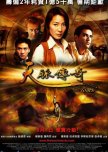
Esta resenha pode conter spoilers
The Touch is a slightly above average Hong Kong adventure film starring Michelle Yeoh. It was the first film from her production company and was directed by Peter Pau, the cinematographer from Crouching Tiger, Hidden Dragon (2002).I'll start with the bad so that I can end on a positive note. The pacing was off and the editing was choppy at times. Some of the young actors weren't very believable, especially the actor playing Michelle's younger brother. The CGI was bad, early video games bad, and in one particular scene no one seemed to be following the normal laws of gravity and physics. The conflict also ended too early.
Now, onto the good, or at least the better. Michelle Yeoh played a splendid acrobatic Indiana Jones, capable of dispatching evil doers with her fists, kicks, and seemingly magic scarf. The fight choreography wasn't the strongest, but she managed to bring the fight charisma regardless. The Big Bad, Richard Roxburgh (Moulin Rouge!), played the villain without going completely over the top, which had to be difficult given the dialogue. Ben Chaplin did an adequate job as Michelle's ne're do well ex-lover who brought her the key to the holy missing relic she was in charge of. Dane Cook who played the Big Bad's useless brother gave some comic relief, which did seem out of place in a movie that more often than not played it straight. I'm back to sounding ambivalent again.
The scenery and sets were top notch and the OST fit beautifully. Overall, the look and sound of the film were quite good. It's unfortunate that the well-trod story wasn't pulled together better with consistency, coherency, better fight sequences, and better dialogue.
If you go into this movie with low expectations, you may find a diverting film. For me, a movie with Michelle Yeoh is never a waste of time.
Esta resenha foi útil para você?
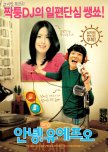
Esta resenha pode conter spoilers
The truth is out there!
Au Revoir UFO or as it's also known, Hello UFO, is a delightful romantic comedy featuring two romantic misfits. It has all the traditional tropes we've come to love and hate back when they were newer and throws in a couple of quick UFO visits just to shake things up.Lee Bum Soo gives a heartfelt performance as Sang Hyeon, a bus driver, whose main joy in the world comes from playing DJ on the mixed tapes he makes for his bus passengers to hear. Lee Eun Joo gives a far more reserved take on her character, Kyung Woo, a blind woman who was recently dumped by her boyfriend. She moved to the outer limits of Seoul to heal and also so that she might once again experience a UFO sighting. They cute meet twice, with Sang Hyeon too afraid to tell her that he is the bus driver and DJ she doesn't care for, giving her a false name and job. Despite his subterfuge, they slowly build a friendship that grows deeper as they spend time together.
UFO is enjoyable, if dated looking. It won't shock you with any serial killer plot twists or reward you with award worthy performances. There are no deep dives into character motivations or childhood connections. When you need a soothing, sweet, gently funny, friends to lovers, old fashioned romance, this 2004 romcom might be one worth checking out.
Esta resenha foi útil para você?
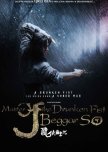
Master of the Drunken Fist: Beggar So
2 pessoas acharam esta resenha útil
Esta resenha pode conter spoilers
If it was HBO Asia's desire to remake a 1970's kung fu movie and remove big chunks of the kung fu this is what it would look like. Beggar So seeks to be more than a martial arts film but doesn't have enough coherent narrative or charismatic acting to accomplish the task.When watching this movie, it might help to do as I did, and reframe it as an episode of a drama because that was what it was closer to than a well-funded film. In comparison to old kung fu movies, the sets and costumes were more elaborate and on par with your average historical Cdrama. The story was as basic as any kung fu movie. The evil eunuch once again appears to wreak havoc on the good and innocent in his bid for power. In this instance, he took So's court position and wealth and nearly his life. Rescued by the Beggar Clan, So learned the Drunken Fist from a master. After several set-backs, So becomes Beggar So and confronts the Big Bads with his new found skills. Most of us could recite the basic structure in our sleep and HBO Asia doesn't attempt to reinvent the martial arts wheel. Mores the pity, kung fu films don't have to stay stuck in the past even if they are set there.
The acting was adequate for the most part. The dubbing for the women was atrocious and distracting. I actually watched it muted for a while and just read the subtitles.
Beggar So's narrative jumped around with characters appearing and disappearing without much explanation. It would go from more realistic to fantasy fighting. Plot elements like certain characters appeared and disappeared as well, popping up when convenient or disappearing when inconvenient.
An early fight showed promise even though the setting under a table was ludicrous. The table would have to be five feet high for what they were doing under it, but at least the fight was entertaining. The writer and director must have forgotten it was named The Drunken Fist because So sure did at times. Everyone seemed able to beat So for much of the movie. The final fight looked more like professional wrestling than drunken fighting. Despite the lack of consistency in the fighting choreography, Beggar So would have benefited with more fights to cover over the thin, very thin storyline.
Master of the Drunken Fist: Beggar So isn't unwatchable. It's a slightly below average made for TV martial arts movie, and that bar is not very high. I've seen much, much worse. If it was made in the distant past of the 1970's I would have graded it on a curve. Beggar So begged to have better acting and writing, thus my grade. Not a terrible watch if it happens to show up on TV but I wouldn't go out of my way to find it.
Esta resenha foi útil para você?

Esta resenha pode conter spoilers
I almost skipped over this movie when it was showing on a Kaiju marathon. That would have been a mistake. The War of the Gargantuas was absurd monster fun.Unlike a lot of Toho monster movies where the monsters don't show up for half an hour (Godzilla I'm looking at you), the monsters showed up early and often. The big green Frankenstein/Gargantua introduced himself when he fought a giant octopus at sea. The enormous sasquatches were called Frankensteins because their origins were from a lab. For the millionth time, Frankenstein was the name of the mad scientist who created the patched together monster, not the monster. But I digress. The initial brotherly love between the gargantuas was sweet until the ginormous good guy realized his bro was a man-eating monster.
In one scene, a singer aboard a ship belts out what felt like the longest song in movie history called "The Words Get Stuck in My Throat". An interesting choice of words right before the ship was attacked. Big Green liked to eat people whole and then spit out their clothes when they got stuck in his throat.
The actors were about what you'd expect from a monster movie from 1966. I was surprised to see Russ Tamblyn who starred in West Side Story (Riff) show up as one of Frankenstein's scientists. He looked like it was the last place he wanted to be, and I've read he was difficult to work with. Too bad. The people who came to watch the movie were looking to have fun and he missed out on the party. Ifukube Akira's score, familiar from his work in the Godzilla movies was well done as always even if some of the work sounded as if it were spliced in from other films.
What I was most impressed with were the miniatures. The houses were detailed, the forests were well done as well as the weaponry and ships. At times in these movies, the miniature buildings were obviously cardboard, these miniatures looked well crafted.
The biggest drawbacks were the monster costumes. They were bad, not King Kong (KK vs Godzilla) moth eaten costume bad, but not great. On the positive side, the costumes did allow for greater body movement, so unlike Godzilla and his buddies, the monsters' movements were less stilted. Many of the scenes from the movie featured one or both of the Frankensteins which made this flexibility advantageous.
This is a movie only for people who enjoy these old monster movies. You can't go into it expecting great acting and a riveting, logical storyline. War of the Gargantuas was ridiculous, but fun. As always, I score older niche movies on a curve.
Esta resenha foi útil para você?
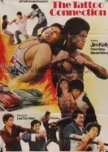
This review is for the sanitized version cut for television. The uncut original version has a lot of cursing and gratuitous nudity. It would probably get a much lower score from me even graded on my old kung fu movie curve.
The story is almost incoherent with terrible editing and of course, the censored cuts. Flash Legs works for big bad Chen Sing who saved him as a child. Chen Sing's gang stole a famous diamond, and they are trying to find a way to fence it. Black Belt Kelly shows up as an insurance investigator whose job it is to find out what happened to said diamond. There are double crosses and lots of high kicking fighting. Jim Kelly, Dorian Tan, Chen Sing, Bolo, and Chiang Tao all did well with their fights even if the fights were cheesy at times.
Tattoo Connection is not a movie I'd recommend unless you're a fan of any of the above. The fights were decent, and it boasted familiar faces to those who watch old martial arts movies. If you find yourself unable to sleep and it's on television, and you're easily amused, you can give it a try. Do not expect good acting, respectful treatment of women, or a storyline that makes too much sense. Bring some crackers and enjoy the cheese.
Esta resenha foi útil para você?
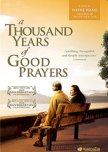
Esta resenha pode conter spoilers
A Thousand Years of Good Prayers crosses generational and cultural boundaries. All people need to feel heard and understood. Misunderstandings and silence can lead to separation. The daughter in this movie has lived in the United States without seeing her parents for twelve years. After she divorces, and after the death of her mother, her father comes to visit from China. What follows is an uncomfortable slice of life focusing on two people who barely know each other.Yilung works at Gonzaga University in Spokane, Washington. When her father comes to visit, she barely makes time to see him, rushing off to work and coming home late. The father doesn't tell her he loves her, but he goes out and buys a wok and cooks for her every night, shorthand for "I love you" in almost any language. During his daily walk to the park, he meets an older Iranian woman and they talk about their kids. In Chinese. In English. In Farsi. With no subtitles. Yet subtitles aren't needed as the parents love and concern for their children comes through in each word, making their conversations understandable to them and us.
The strain between father and daughter only tightens until a wall cracks and truths emerge. Healing doesn't come overnight as with any relationship. They begin to understand each other better, as do we.
This film is shot simply, with few sets. Each of the performances was natural as if we were watching real people face the days. Henry O's performance of a father trying to cross a generational barrier with his daughter and a language barrier with the people in town was sympathetic. The father could also be frustrating when he failed to realize his grown daughter had her own wants and needs when he wanted to find her a good husband so that she didn't fail twice. Faye Yu, for the most part, gave the difficult performance of a daughter avoiding her father, seemingly ungrateful, all the while holding in a secret that kept a great chasm between them.
A Thousand Years of Good Prayers is slow and narrow in focus and definitely not for everyone. It is a simple, thoughtful film concentrating almost exclusively on two people and how presumptions and lack of communication brought them to a place in their lives where both felt lonely and hurt. If you like slice of life films, especially about families, this might be one to try.
Esta resenha foi útil para você?
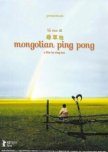
Much of this film is wrapped up in showing slow, flowing shots of the terrain, an endless sea of green, distantly bordered by mountains. The boys live in a world without electricity and running water. There are no phones, video games, or computers. One father buys a television, but even using his long herding rod as an antenna with cans and cooking strainers attached, can't get a signal. Climbing, exploring, riding their horses, playing with sling shots, and contemplating the mystery and responsibility of their new found treasure fills their days.
The strength of this film is in its hospitality and letting us be guests, sharing for a few brief moments, in a world foreign to most of us. There are no great conflicts outside of the ping pong ball, although it is obvious that a creeping consumerism is beginning to invade the old way of doing things. For the most part, it is best to simply immerse yourself in the warmth and curiosity of these children and enjoy the expansive beauty of a solid green sea.
Esta resenha foi útil para você?
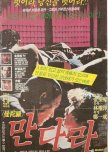
The two monks may have traveled together, but their roads to the top of the mountain were slightly different. One monk, Poban, adhered to the rules, the other, Jisan (who had been kicked out) seemed to go out of his way to break them. In their duality of thought they were not that far apart, both were seeking to let go of attachments and find the real meaning in their faith and how that should be lived out in their lives. What was more important-prayers or action? Avoiding temptation or facing it head on? Being attached to the rules or breaking through them? From time to time their pasts and mistakes caught up with them, crashing through their thoughts, forcing them to deal with them and answer some of those questions. The conversations were dense with meaning and would take a third or fourth viewing for me to truly grasp the deeper elements.
Though years passed, it seemed ever winter in the landscape, cold, gray, and austere. This movie truly needs a loving hand to re-master it, saving it from the graininess of age. I'm sure the images were originally crisper and clearer.
Mandala isn't for everyone. It is slow, focusing narrowly on the two leads and their conversations regarding life and Buddhism. As Jisan said, "Attaining enlightenment is easy, putting it into practice is difficult." Forty years after the release of this film and countless world events since then, this message still found and resonated with me reminding me how timeless some films can be.
Esta resenha foi útil para você?

Esta resenha pode conter spoilers
Tony Leung Ka Fai, Maggie Cheung, and Brigette Lin have the ultimate slumber party in the middle of the desert at the Dragon Gate Inn.The hero, Chow Wai On, sends Yau Mo Yan and some mercenaries to save the children of an executed loyal official who are being used as bait. The power mad eunuch is back at it again and this time he's cleaning house of anyone not loyal to him and he wants Chow's head on a platter. Chow and Mo Yan rescue the children and get as far as the Dragon Gate Inn in the middle of the desert. It's run by Jade who is ruthless in her own right and has an eye for Chow. Things get complicated when the Eunuch's men show up at the inn and everyone is trapped there due to the weather.
Tsui Hark did a good job of creating a claustrophobic atmosphere as deadly games were played within the inn. My problem with it was that he didn't slow the pace enough for us to get to know any of the characters. Maggie Cheung's Jade was the only one who came across with a personality. Tony Leung Ka Fai and Brigette Lin had little to do besides fight and call each others' names. He didn't have many lines, but I was happy to see Yen Shi Kwan in a supporting role. Donnie Yen was in what amounted to a guest starring role as the Eunuch.
Most of the fight scenes didn't work for me either. I have no problem with wire work but much of the focus was from underneath the fighting which made it harder to follow the movements. Swords missed by great distances. These martial arts directors usually do a much better job of interspersing real kung fu moves and narrowing the focus to show the action, here everyone seemed to be jumping around in a frenetic pants on fire style. If there was something I did really like it was that the women were capable fighters, especially Jade.
Though the characters were only in the Dragon Inn for two days it began to feel like two weeks with nothing aside from the random deaths going on. Even with hints of romance, a great cause, friendship, betrayal, etc., with all the random scenes it was hard for me to get invested in any of the characters or their relationships.
The final fight scene in a sandstorm was bonkers but couldn't make up for the messy chaos in the inn. Because this is post 1990 it doesn't get graded on a curve with me like earlier martial arts movies. If you like kung fu movies, and the cast is strong in this one with some of my favorite actors/actresses, Dragon Inn is worth seeking out. Just ask for the vegetarian meal if you ever go there.
Esta resenha foi útil para você?

Esta resenha pode conter spoilers
What do you get when you cross a martial arts movie with steam punk, computer graphics, pop-ups, a comic book, and a video game? Tai Chi Zero.The Freak was a martial artist born with a small horn on his forehead foretelling greatness. After his mother died, he was taken in by a master (Fung Hak On) and ended up on the wrong side of a battle against the ailing Qing army. He escaped to the famed Chen Village where he hoped to learn kung fu techniques that would heal the wounds caused by his many battles causing him to be near death. Problem was, outsiders were not allowed to learn any of the techniques. He ended up fighting most of the village and the Chief Master's daughter, Angelababy (more often than not), as he tried to convince them to teach him.
Jayden Yuan, a real life wushu champion, played The Freak. Martial artists like Fung Hak On and Bruce Leung also gave the movie martials arts cred. All of which came crashing down when Angelababy's character was supposed to be a martial artist. In fairness, Jayden in only one of his two movie credits, wasn't a very strong actor so the movie needed people around him like Tony Leung Ka Fai who could act. Even Angelababy looked Oscar caliber in comparison to Jayden, though he was far more convincing in fight scenes.
I won't get into the story, because honestly, it's convoluted. Fortunately, it was fun and funny, never taking itself too seriously even when the big life or death battle began at the end. This movie is not for everyone, and it is far, far from perfect, but if you can check your brain at the door, it's diverting enough to be entertaining.
Spoiler/Not Spoiler Alert (the sequel is listed in the credits above)! There is a part three/finale.
Esta resenha foi útil para você?

Esta resenha pode conter spoilers
A Summer at Grandpa's sounds like an idyllic childhood romp through the flowers. And while there are moments of childhood glee, this is a Hou Hsiao Hsien film and there's always a deeper narrative camouflaged under the sunny surface.Tung Tung (11) and Ting Ting (4) were sent to their maternal grandfather's rural house for the summer while their mother lay ill in a Taipei hospital. Far from a cuddly grandpa, this grandpa was the village's doctor and rarely interacted with the children. Tung Tung made friends quickly with the local boys. In the days before cell phones, dvds, cable, and video games they did what most kids did, went outside and played. They skinny dipped in the local creek splashing and playing. Again, Hou never leaves any scene too shiny, and the boys had to exit the creek when cow dung floated into their play space.
Ting Ting suffered the fate of many a little sister and was left out of the boys' games. She spent most of the time with her stuffed animal or plastic fan, ultimately befriending the local mentally ill woman.
As Tung Tung hung out with his friends or lounged bored at his grandpa's house, he began to see behind the world of the adults around him. His childhood became breached by reality and the signaling approach of growing up. Even in the pastoral town, rape, an aggravated assault and robbery, a shot gun wedding, and family discord took place. Tung Tung went from casual observer to participant in the adult world around him as the movie rolled on. He also discovered that adults were capable of childish, petulant behavior. Adulthood, it would seem, is an ongoing process.
This film is a slow slice of life story shown through the eyes of an eleven-year-old boy as those eyes begin to open to what is happening outside of himself. A Summer at Grandpa's bids Tung Tung and the audience to become more observant of the small details and meaning in the world around us.
(Trigger warning---if you are sensitive to animals being harassed or dying you might want to skip this movie or fast forward through a couple of scenes.)
Esta resenha foi útil para você?
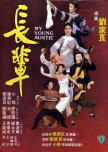
The synopsis does not do Kara's character justice. Cheng Tai Nan married an elderly man and second brother in the Yu clan who had taken good care of her and her father. He had made the special request so that she could see to it that his will and property deed went to his brother Yu Jing Chuen (the amazing Lau Kar Leung) and not to his nefarious brother Yu Yun Wei (Johnny Wang). Her husband died soon after their marriage and Tai Nan took the deed to Jing Chuen and was prepared to help him defend this inheritance. Tai Nan had incredible martial arts skills and did not suffer fools lightly, always ready to put the beat down on disrespectful rascals-including her new grandnephew! She represented the old ways as she bumped heads with Hsiao Hou's character and the encroaching modern (cars in a Shaw Brothers movie!) elements and Western influences.
Kara Hui was the gem in this goofy kung fu comedy. Her skills and beauty took center stage until she was sidelined for the final fight. She also won the first ever Hong Kong Film Award for Best Actress for this role!
Lau Kar Leung wrote, directed, and choreographed this film. It's no secret he's one of my favorites. His fights are always quick and creative. I could almost forgive him for keeping Kara out of the final fight because it meant a showdown between him and Johnny Wang.
Hsiao Hou's performance as Charlie Yu Tao, Jing Chuen's reckless and immature son could be wearing. While an acrobatic martial artist, his acting is usually over the top and devoid of any nuance.
Johnny Wang played the role he's played so many times before, and yet always does a good job. Gordon Liu in a wig showed up as one of Charlie's friends. A long list of supporting and bit characters played by martial artists made my fangirl heart sing.
The sets were the best I've ever seen in a Shaw Brother's movie, none of the obviously cheaply made walls and windows for people to be thrown out of. People were thrown around, just on a higher class set.
For me, the movie ran about 30 minutes too long. There simply wasn't enough story to tell and some of the dance numbers/fights dragged on. Having a very young, great auntie and elder of the clan was a nice gimmick even if it was run into the ground at times.
My Young Auntie is a kung fu classic even if parts of it haven't held up well. For fans of Kara Hui or Lau Kar Leung it's worth watching.
Esta resenha foi útil para você?

Donnie Yen's character, Henry Chen, returned to teach at his old school after serving in the United States military. He was assigned to the worst class in the school. What he found were standard movie fare students---poor students, students with parental problems, misunderstood kids, racism, kids running errands for gangsters, stressed kids, kids with unfulfilled dreams. Chen studied their histories and then stepped in to make things right by unconventional means.
In addition to the teenagers' problems, the school was in danger of being shut down because of underachieving students. Throw in gangsters who intended to develop the area where the school sat, and you've got all you need for conflict. Add in a couple of awesome fights when the plot slowed down or became too serious to keep the audience invested and you've got a winner-it's Donnie Yen, we don't expect him to solve all of his problems in a peaceful way, do we?
Donnie elevated a familiar and at times clichéd story with his star power. He transitioned over to less action and more acting smoothly in this film. The kids were likeable even when doing unlikeable things. One problem with such a large cast, the villains were underdeveloped even though one had a key connection to Chen.
This movie was a combination of social concerns and martial arts displayed in a fairly balanced manner. Some problems may have been solved too easily, but sometimes we need to believe that children can be saved from others and themselves and that someone cares enough to risk stepping in to help them. Big Brother had moments of inspiration and enough action and character development to keep it entertaining. Donnie Yen as Henry Chen didn't just save the children in this story, he saved this movie as well.
Esta resenha foi útil para você?

Esta resenha pode conter spoilers
Love does mean saying you are sorry
The synopsis for Romang sounded romantic, bittersweet, and heartwarming. Before I watched this movie I read comment after comment about how it made people ugly cry. This movie made me angrier than it did sad. And I found it more bitter than sweet. More heartbreaking than heartwarming. It might be more apt to say it's about a family that in their response to a tragedy years ago, lost the ability to love and laugh and became locked into a terrible dysfunctional cycle.The father was a taxi driver who was cold, angry, selfish and unapologetic. The mother worked as a hairdresser out of their home, usually on the roof, and either absent-mindedly or passive-aggressively neglected to do the things her husband expected and demanded. Their son who lived with them along with his wife and daughter couldn't hold down a job. The home bristled with resentment and lost dreams.
When the mother was diagnosed with dementia, the little family initially exploded. By the time the movie caught up with the synopsis, I was beyond caring about any of them. Also, at that point, it stretched credulity in the way dementia was portrayed, or at least compared with the experiences in my extended family. The emotional U-turn of the father nearly gave me whiplash.
A seasoned cast gave admirable performances full of emotion and pathos. The OST was beautiful as well. For me, the uneven writing let me down right to the bitter end. I'm all for a good tear jerker or even a melancholy slice of life, somehow this one managed to miss all the right steps for me by abruptly changing mood and not giving good reasons for characters' changing behaviors unrelated to their diseases And contrary to what Ali MacGraw said in Love Story (1970-"Love means never having to say you are sorry"), love does mean saying you're sorry.
Esta resenha foi útil para você?
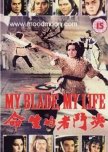
Pearl Chang Ling starred as Lu Du Shing AKA Lone Traveler Wu, the swords"man" in search of Peerless Swallow, a renowned swordsman. Poor Pearl was dressed in a wooly tunic for the length of the movie. She looked more like a vagabond than a skilled swordswoman. Violent and with a temper to match, she dispatched anyone who crossed swords with her, or just plain crossed her, ruthlessly. As per usual, everyone accepted her as a man until the shocking reveal late in the movie. Pearl did a good job playing the single-minded warrior who wanted to be free of her duty and was willing to slice her way through the kingdom to get there.
The plot was needlessly complicated by varying factions which didn't add anything to the main story. The plot revolved around Wu and Peerless Swallow's family histories and the dire consequences and burdens left to the children of swordsmen. Wu had sacrificed her entire life to become a swordswoman to fulfill her father's wishes. Chained to a sword for ten years, unable to free herself of it unless she fulfilled her mission or died trying. Ling Yun played Peerless Swallow, the object of Wu's scorn. He gave a suitably noble turn as a man who was tired of the swordsman code of endless fighting.
My Blade, My Life was shot in Taiwan. The sets were rudimentary, the costumes outlandishly bright at times. The score was forgettable except for the original Star Trek sci-fi sound effects during fights.
If they'd trimmed this movie to around 90 minutes and cut away much of the useless cast and story, I would have rated this movie higher. As it was, it dragged on too long when Pearl and Ling Yun were the heart of the story.
Esta resenha foi útil para você?

 55
55 217
217 11
11






















